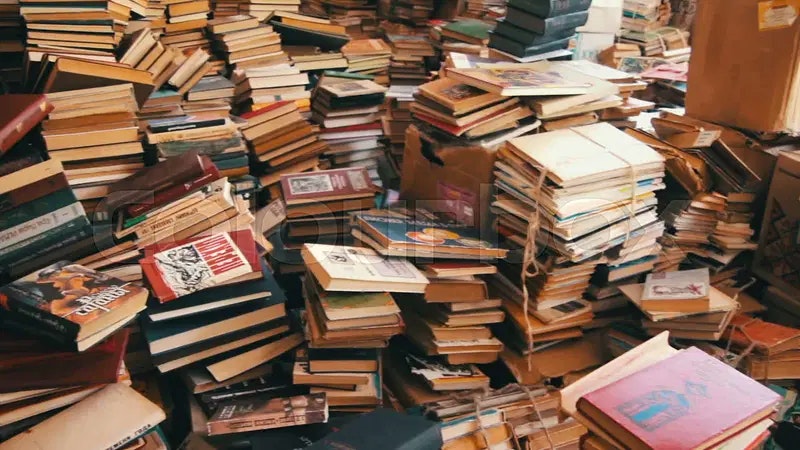Books defined my FOO (family of origin) and articulated the space we occupied together. Books seemed to be our religion. My mother, raised by communist atheists, taught me that our being Jewish amounted to exactly one thing: we’re intellectuals, readers, "people of the book." I was surprised, as I went on and started marrying people, to meet Jewish people who were more involved in anesthesia, accounting, or golf than reading Philip Roth and Claud Lévi-Strauss.
Joyce built a house full of literature, especially favoring classic Russian novelists. But until she started struggling with her vision, she was a massive reader of just about everything, from philosophy and anthropology to fantasy fiction. My father, who came from DC journalists, worshiped Ambrose Bierce and H.L. Mencken and tended toward literary treatments of scientific topics by authors such as Loren Eisley and Lewis Thomas. My step-father, who showed up with his own boxes of books when I was around 12, was an aficionado of "the human sciences," filling shelves with classics of psychology and sociology.
It was the sort of family where, in spite of various dysfunctions, disagreements, and disasters, we gathered every Wednesday evening for a poetry reading, and where we had plenty of classic and contemporary material to choose from the shelves: all of Dylan Thomas, W.B. Yeats, Robert Frost; but also Theodore Roethke and the young W.S. Merwin.
All these items accumulated in our house on Livingston St. in DC, though I admit that when I moved out at 18 in 1976, I took some of the books with me. I swiped more as the years went on, including most of the philosophy books (I was working on a career as a philosophy professor). My parents had lovely old editions of books by John Dewey and Friedrich Nietzsche, to whom I was first exposed at home as a child, and which I purloined and used in my research. I first read George Santayana, for example, by plucking something randomly from my parents' bedroom, and eventually thumbed their copy of Scepticism and Animal Faith to the point where it disintegrated. It formed the basis of my epistemology.
Anway, I didn't think they needed their philosophy books anymore; it was my turn. I was sure that if I asked, they'd say yes. But I didn't ask. The books just moved like dandelion seeds from my parents' house of books to mine.
I spent the ensuing 50 years or so building and refining a house of books: hundreds of books, thousands. I frequented used book stores. Sometimes, early on, I shoplifted (I needed those copies of the collected works of Plato and Aristotle, which were just sitting there at the Hopkins store and which I’ve used approximately every month for 40 years). But I went through various patches and fads, gathering manga in one, offloading those and collecting books on magic with playing cards in the next. From my parents' house I also took a number of books that had been my favorites as a child, such as Swallows and Amazons. And then I added many books for my own children.
I hit a dangerous point in the mid-1990s, when I realized that Amazon would ship any book in print to your house within a couple of days. As someone who liked to live way out in the country and had often special-ordered obscure books at stores and waited "four to six weeks," the advent of Amazon was a miracle. But it expanded the volume of volumes to the point where it began to seem perverse. I’ll borrow novels from the library, insofar as I read novels, but with non-fiction I like to mark the pages up and scribble notes all over: I think of books as tools for my use rather than as sheer objects of veneration.
But it's true that owning books is in some respects a hassle and is perhaps becoming obsolete. My parents moved from their house in DC to a place in the country in Virginia in 1984; hauling the books was the hardest part. Every time I've moved my books, it's given me a backache and I've sworn off, or sworn to read on a Kindle from now on, or just deal with pirated PDFs. But then I find myself wanting a book and going ahead and buying it. I still can't stop; I always think that, for me, the decision to buy a book is a wholesome and defensible decision.
My mother agrees.
I just moved my library for what I expect to be the last time. My mother is 100, and my wife and I moved to her beautiful house near the Blue Ridge, which we stand to inherit. Yesterday I finished getting all the books out and integrated, a weeks-long job even in the non-systematic way I’m pursuing it. All the philosophy books I took in 1978 or so have returned, except for that disintegrated Santayana. But now there’s an excellent philosophy library of broad scope here, to go along with the excellent mid-20th-century anthropology and psychology and the excellent Russian lit. Plus there’s a combined shelf featuring books written by members of my family: myself, my mother's father Murray Gitlin and her grandfather Herman Bernstein, my ex Marion Winik, my uncle Carleton Coon and a bunch of others, including my mother. It's not surprising that writers came out of these houses of books.
I'm unexpectedly choked up, for example, by the sight of our combined shelf of poetry right there in the living room, and I've started reading poetry again. Moving these books was a hell of a haul. I have a backache, but I think my FOO, both the humans and the books, are finding repose in our return.
—Follow Crispin Sartwell on X: @CrispinSartwell

